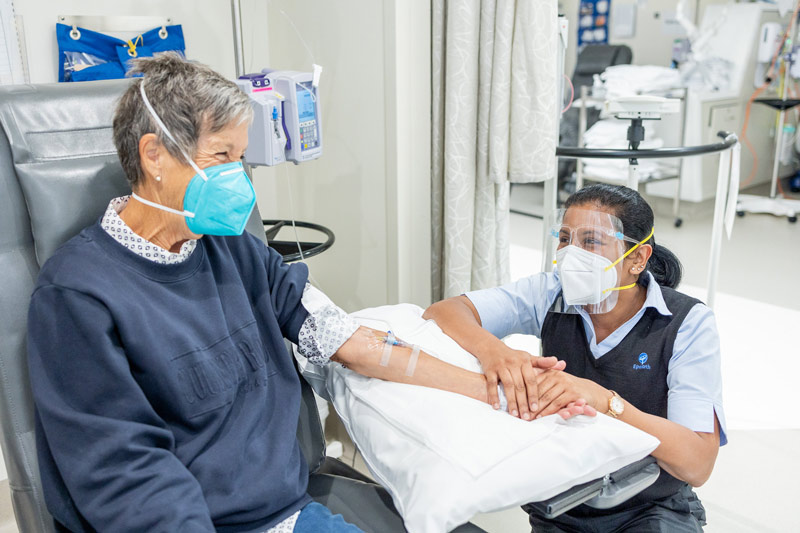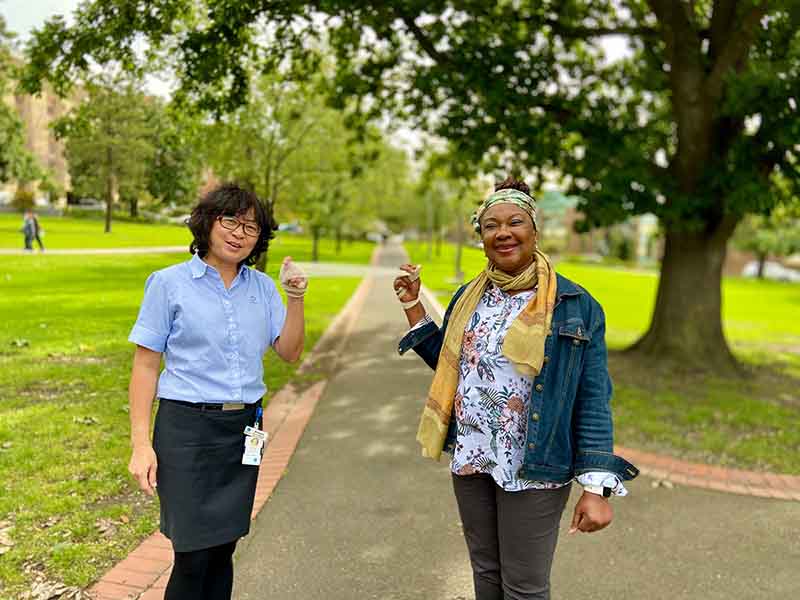What is the Women's Health Unit at Epworth?
Our Women's Health Unit team are highly skilled in the treatment and care of women with gynaecological cancers. The Medical Specialists, Gynaecological Clinical Nurse Consultant, Allied Health and Ward staff work closely with patients and families providing expertise, education, and support at this challenging and stressful time.-
What is ovarian cancer?
Ovarian cancer is a growth of abnormal cells in one or both ovaries. The cells grow and form a lump called a tumour. Some cases of ovarian cancer may form in the fallopian tube and spread to the ovary.
Each year, around 1400 Australians are diagnosed with ovarian cancer. It can occur at any age, but is more common in those over 50 years old. It is the 10th most common cancer in women in Australia. Transgender men and intersex people can get ovarian cancer if they have ovaries.
-
Are there different types of ovarian cancer?
Yes, there are three types of ovarian cancer:
- Epithelial ovarian cancer: This cancer arises in the surface of the ovary (epithelium) and is the most common ovarian cancer. It accounts for 90% of all ovarian cancers. Types of epithelial ovarian cancers include serous, clear cell, mucinous and endometrioid cancers.
- Non-epithelial cancers: These types of cancer arise in different parts of the ovary and are uncommon: Germ cell ovarian cancer – starts in the egg-producing cells, usually affecting women younger than 30.
- Sex-cord stromal cancer:This type of cancer develops in the cells that release female hormones. Some women are diagnosed with a borderline tumour. Borderline tumours are not considered to be cancer as there is little risk of spread.
-
What increases the risk of ovarian cancer?
The causes of ovarian cancer are not well understood, but there are some factors which increase the chance of developing this disease:
- Age
There is a higher incidence of the disease in women over 50 and in people who have stopped menstruating (been through menopause). The risk increases with age.
- Reproductive history
Women who have not had children or were unable to have children may be slightly more at risk.
- Hormonal factors
Early puberty or late menopause, or using oestrogen-only hormone replacement therapy.
- Genetic factors
Up to 20% of women diagnosed with ovarian cancer may have an inherited faulty gene in their family. There are two genetic conditions known to be associated with an increased risk of ovarian cancer; hereditary breast/ovarian cancer and Lynch syndrome. Lynch syndrome is also known as hereditary non-polyposis colorectal cancer (HNPCC).
- Family history
The risk of developing ovarian cancer increases with the number of affected first degree relatives (parents, siblings, children). Ashkenazi Jewish women with a family history of breast or ovarian cancer are also considered to be at a higher risk of the disease.
Women considered to be at an increased risk of developing the disease are monitored regularly and some may elect to have preventative removal of their ovaries.
- Age
-
Is there anything I can do to protect myself against ovarian cancer?Taking the contraceptive pill for a number of years appears to give some protection against ovarian cancer, as does breastfeeding (limited evidence regarding this).
Signs and symptoms
At present, there are no effective screening tests for ovarian cancer. We encourage you to recognise what is normal for your body and if changes are persistent, speak with your GP for peace of mind.
Symptoms of ovarian cancer:
- Abdominal bloating
- Unexplained weight gain or loss
- Urinary frequency or incontinence
- Pain during sexual intercourse
Epworth fact sheet | Ovarian cancer
Colposcopy Clinic at Epworth Freemasons
Diagnosis
Epworth uses a range of diagnostic tests to thoroughly investigate signs and symptoms of underlying health concerns.
Below is an overview of common tests used to diagnose ovarian cancer.
Physical examination
Your GP or specialist may perform an exam called a colposcopy. This allows your doctor to view the tissue and any abnormal cells in the cervix and vagina.
Blood test
Your doctor may order several blood tests to check your overall health and to detect proteins produced by cancer cells. These proteins are called tumour markers.
Ultrasound
An ultrasound may be one of the first tests you encounter following a blood test and physical exam. Your doctor may recommend an abdominal and/or a transvaginal ultrasound.
- Abdominal ultrasound
The sonographer moves a small device (transducer) over your abdominal area
- Transvaginal ultrasound
A small transducer wand is inserted into the vagina to provide a clearer picture of both ovaries, uterus, bladder and bowel.
CT scan
Computerised tomography (CT scan) uses X rays to compile three-dimensional pictures of the inside of your body to look for cancer in lymph nodes or other organs.
MRI scan
Magnetic resonance imaging (MRI scan) creates detailed cross-sectional pictures using magnet and radio waves.
PET-CT scan
Positron emission tomography (PET-CT scan) provides more detailed information by highlighting cancer cells which use more glucose than normal cells.
Staging - Investigating the extent of the cancer
During your initial diagnostic tests, your care team may be able to stage your cancer at the same time during a biopsy or CT, MRI, or PET scans.
What does my cancer stage mean?
Staging is a term used to describe the size of the cancer and whether it has spread. Staging helps your care team and specialists to create a unique treatment plan.
Stage 1
Early cancer where the tumour is found only in the tissue of the ovaries.
Stage 2
Cancer has spread from the ovaries to the upper two thirds of the vagina or other tissue nearby.
Stage 3
Cancer has spread to the lower third of the vagina and/or the tissue on the pelvic wall or to lymph nodes in the pelvis or abdomen or the urinary system.
Stage 4
Sometimes called advanced cancer, stage 4 means cancer has spread to the bladder or rectum (stage 4A) or beyond the pelvis to the lungs, liver or bones (stage 4B).
Grading
The cancer will be graded based on how likely the cancer is to grow quickly, and how the cancer cells look compared to normal cells under the microscope. Grade 1 is low grade, grade 2 is moderate, and grade 3 is high grade and likely to grow quickly.
Find your Epworth gynaecological cancer specialist
View our gynaecologists and medical oncologists with a sub-specialty in gynaecological cancers (cervical, ovarian, uterine and vaginal and vulvar cancer).
Treatment
At Epworth, our specialised Gynaecology Cancer Centre will provide you with a team of experts who work together to create a treatment plan that considers your needs and circumstances.Treatment overview
Depending on the stage of your cancer, you may be recommended surgery or a combination of chemotherapy and radiotherapy.
- Surgery
Surgery is first line treatment for cancer that has not spread beyond the ovaries.
Learn more
- Targeted therapies
Targeted therapies are the use of drugs to attack specific weaknesses in cancer cells, killing the cells to prevent the cancer growing.
- Radiotherapy
Radiotherapy is the use of radiation (X-rays) to kill or injure cancer cells.
Learn more
- Chemotherapy
Chemotherapy is a common form of treatment that involves the use of anti-cancer drugs to kill or slow the growth of cancer cells. Chemotherapy is often used alongside other treatments such as radiotherapy and surgery.
Learn more
Multidisciplinary Team (MDT) Assessment and Plan of Treatment
You will have access to an MDT to plan the management of your cancer. All members of the MDT have a special interest in gynaecological cancer, and include:
- Gynaecological oncologists
- Medical oncologists
- Radiation oncologists
- Gynaecology clinical nurse specialists/oncology liaison nurse
- Gynaecology histopathologists/cytologists
- Physiotherapists
- Radiologists
- Research staff
- Genetics counsellors
- Social workers
- Psychiatrist/psychologist
- Pastoral Care
- Rehabilitation team
Surgery
Why choose Epworth to perform cancer surgery?
Our gynaecological oncologists perform more than 1,000 major gynaecological cancer operations each year. Epworth was the first private hospital group in Victoria to treat gynaecological cancers using robot-assisted surgery.
Ovarian cancer surgeries:
First line treatment for ovarian cancer is generally a surgery to look inside the abdomen (laparotomy). This may involve surgical debulking, to remove as much of the cancer as possible. Surgical debulking allows chemotherapy treatment to be more effective.
Types of ovarian cancer surgery:
- Radical or abdominal hysterectomy
A radical hysterectomy, removing the uterus, cervix, soft tissue around the cervix, the top of the vagina and the fallopian tubes. - Bilateral Salpingo-oopherectomy – BSO
This surgery involves the removal of both ovaries and both fallopian tubes. - Omentectomy
Removal of the fatty protective tissue (omentum) covering the abdominal cavity. - Colectomy
Removal of all or part of the bowel. - Lymphadenectomy
Removal of the small bean-shaped organs that help filter toxins from the blood stream (lymph nodes).
Radiotherapy
Epworth oncologists use radiation to cure, control and reduce gynaecological cancer cells for our patients.
Radiotherapy at Epworth
Epworth offers patients radiotherapy through our provider, Icon. As Australia’s largest dedicated cancer care provider, Icon has a long history of delivering exceptional cancer care to the Australian community.
Supported by the latest world-class technology and evidence-based techniques, Icon’s highly experienced team of radiation oncologists, radiation therapists, physicists and nurses are committed to providing compassionate, exceptional care for patients and their loved ones.
What is radiotherapy?
Radiotherapy is the use of radiation to treat and manage cancer.
What are the side effects of radiotherapy?
Side effect types and duration will vary from person to person. Some general side effects may include:
- Fatigue
- Skin irritation
- Feeling weak
- A stinging sensation when urinating
- Diarrhoea
Will I need radiotherapy?
Your oncologist will speak with you to decide whether radiotherapy is the right treatment option for you.
Chemotherapy
Your medical oncologist will oversee your chemotherapy. These specialists work closely with surgeons, radiation oncologists, physicians, nurses, and allied health professionals to ensure that all elements of your care are coordinated.
Your medical oncologist will explain and discuss current treatment recommendations and the opportunity to participate in appropriate clinical trials.
How will I receive my treatment?
The treatment can be given orally, through an intravenous cannula, direct introduction to the affected organ/tissue or as a cream. Chemotherapy is often given in courses or cycles with periods of rest in between, allowing normal cells to recover.
Are there different types of chemotherapy?
Yes, there are many different types of chemotherapy. Your care team will explain which chemotherapy is best for your circumstance.
What are the side effects of chemotherapy?
Our team is here to support you throughout your cancer journey and will help you prevent and manage these potential and often temporary side effects.
Side effects may include:
- Nausea and vomiting
- Diarrhoea or constipation
- Fatigue
- Hair loss
- Muscle weakness
- Skin sensitivity to sunlight
- Dry or tired eyes
- Loss of appetite
Epworth Wig salons
Head wear and wigs are offered to all Epworth patients experiencing hair loss at our convenient on-site salons. This service is provided via the generosity of our Epworth Medical Foundation donors so there is no cost to patients.
How do I prepare for chemotherapy?
- The Gynae Clinical Nurse Consultant and Oncology Liaison Nurse Consultant will provide education and a support pack for your information and explain the chemotherapy process.
- You may be able to use “cold caps” to prevent hair loss or may like to be fitted for a wig prior to starting chemotherapy in case you need it.
- Recovering from surgery, eating well, staying well hydrated, sleeping and exercising will all play a part in preparing for chemotherapy.
- You may choose to have your chemotherapy at one of Epworth’s Day Oncology Units or a unit closer to your home.
- If you have children or grandchildren from babies to age 18, you may like to read the Cancer Council book: Talking to Kids About Cancer. The ward team can provide a copy.
Epworth cancer care locations
Rehabilitation with Epworth
Ovarian cancer locations:
Ovarian cancer rehabilitation
Rehabilitation doesn't just start after your treatment has ended. If you've recently been diagnosed with cancer or are already in your cancer treatment journey, we highly recommend that you participate in our holistic oncology rehabilitation program.Overview
Epworth offers patients programs to support their wellbeing before, during and after treatment. We believe this approach allows our patients to feel best prepared for treatment or feel more like themselves following surgery or other medical interventions.Who is the program for?
Our cancer rehabilitation program is designed for anyone diagnosed with gynaecological cancer at any time from diagnosis to treatment and recovery.What does the cancer rehabilitation program involve?
Before you start
You will meet a rehabilitation doctor and allied health team for a medical, psychosocial, and physical assessment.
Everyone's cancer care journey is different. The assessments will help the team understand your specific needs to develop the right program for you. You will work with the team to develop goals to work towards throughout the program.
During the program
Depending on your assessment and individual needs, you may complete your program:
- as part of a group, with other people, who have been diagnosed with varying cancers
- on your own, one to one with the rehab team members.
A typical program may involve:
Most people will attend as an outpatient, coming to hospital for a few hours once or twice a week, over several weeks. Some people may need to stay overnight in hospital and complete a program over several consecutive days.
Either way, you will receive the same support from our team to address your physical, functional and emotional needs.
Your rehabilitation program may focus on the following:
- A physical exercise component to help restore movement, strength and fitness.
- An educational component where you will learn about different areas associated with your cancer diagnosis and treatment and how to manage them, including:
- fatigue
- pain
- emotional wellbeing
- body image and self-esteem
- work or family challenges
- relationships
- late-onset of side effects.
At the end of your program
Our rehabilitation team will keep in touch with your referring doctor and/or treating team throughout the program and will let them know how you went at the end.
They will also connect you to local services and support networks so you can leave the program with strength and confidence to live life to your fullest potential.
Who will support me during the rehabilitation program?
Depending on your needs, you may see some or all of our multidisciplinary team which includes:
- Rehabilitation specialist doctor
- Cancer nurse
- Exercise physiologist
- Physiotherapist
- Psychologist
- Social worker
- Occupational therapist
- Dietitian.
How can I access a rehabilitation program?
Referrals
A referral from your specialist or GP is required to participate.
Ask your doctor to complete the referral form at www.epworth.org.au/rehab and return it to us via fax: 03 9982 6696 or email: [email protected]
Locations
Group programs are located at Epworth Camberwell and Epworth Hawthorn.
Individual programs can be accessed at Epworth Brighton, Epworth Camberwell, Epworth Geelong, Epworth Hawthorn or Epworth Richmond Rehabilitation.
Contact us
If you have any questions about our cancer rehabilitation programs, call us on: 1300 345 600.
Life after treatment
Life after cancer treatment can pose its own challenges but our Epworth specialists are here to support you.Life after cancer treatment can be a mixture of emotions. You may not 'bounce back' as quickly as you expected to, but be kind to yourself.
Remember that:
- You may still feel fatigued after finishing treatment.
- You may like to make an advanced care plan with the assistance of our social worker. We encourage you to speak with your care team to learn more.
- Ask for help. If your body has changed due to treatment, remember help is out there to support you to feel your best and regain your sense of identity and self-esteem.
- Speak with your care team about options to support your general wellbeing after treatment. The Cancer Council provide a free telephone intimacy counselling service (13 11 20). Your care team can also make referrals to sexual counsellors, menopause, fertility and lymphoedema experts.
Follow-up appointments
Epworth patients in remission for gynaecological cancer will have follow up appointments every three months, alternating between surgical and oncology specialists. This will also involve tumour marker blood tests and imaging, such as PET or CT scans.
Managing your health and wellbeing ongoing
Knowing how to best manage your wellbeing ongoing is an essential step toward recovery. We encourage people who have been living with ovarian cancer to stay active, eat healthy foods, sleep well and enjoy your post treatment life. You may like to explore different ways to relax, such as meditation, yoga or massage.
The Memorial Sloan Kettering Cancer Centre (New York) website has many useful online videos about adjusting to life after cancer, with useful dietary and lifestyle advice.
Find your Epworth gynaecological cancer specialist
View our gynaecologists and medical oncologists with a sub-specialty in gynaecological cancers (cervical, ovarian, uterine and vaginal and vulvar cancer).


